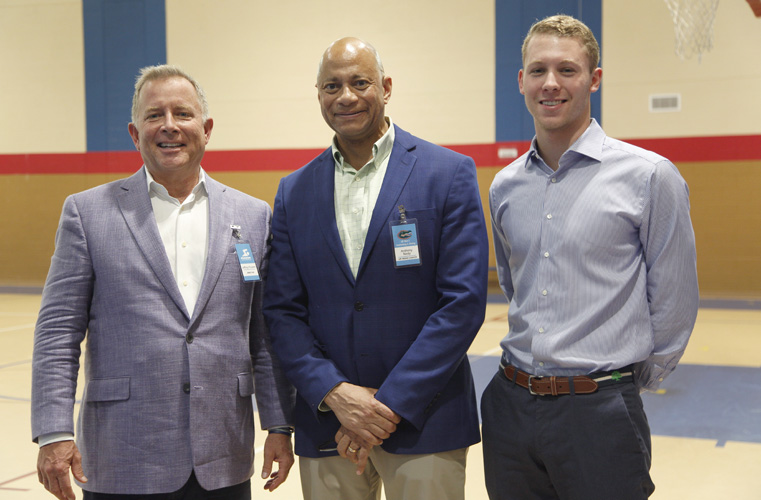Prior to gatherings being canceled due to the pandemic, Anthony Nesty, the first black swimmer to win Olympic gold, delivered an uplifting message to children from the Vero Beach, Sebastian and Fellsmere Boys & Girls Clubs of Indian River County and the Gifford Youth Achievement Center that anything is possible through hard work and determination.
Nesty, from the tiny South American country Suriname, was the perfect example of that realization. Racing in the 100-meter butterfly, Nesty won gold in the 1987 Pan-American Games followed by an Olympic gold medal, Suriname’s first medal, at the 1988 Summer Olympics in Korea. Nesty shared that the win was so unexpected and the country so little known, it took organizers some time to track down the Suriname national anthem.
After graduating from the University of Florida in 1994, he served on the Gator coaching staff 22 years; the last two as head coach of men’s swimming and diving. Nesty is also very familiar with Boys & Girls Clubs, which he called “one of the greatest organizations in the world,” having served four years as the B&GC aquatics director in Sarasota.
The majority of the youngsters who heard his talk in the gymnasium of the B&GC Vero facility were also enrolled in Float Hope of IRC, a nonprofit founded by Jeff Powers and Scott Barlow. The organization teaches swimming to low-income students, a skill they can use to “swim their way to success” through self-confidence, friendships and college scholarships.
Float Hope currently sponsors some 125 financially disadvantaged, primarily minority, children, transporting them to either the North County or Gifford Aquatic Centers, where they are coached by Barlow and his wife, Holly McClain.
“What we wanted was someone who the kids could look up to,” said Powers, noting that like them, Nesty was raised in poverty but used the sport to overcome adversity.
Nesty shared that he initially didn’t like swimming and the practice it entailed, but as he began to win medals, his father recognized his potential.
His father challenged him to compete in a 10K race, saying, “Promise me one thing. If you win the race, you’ll continue to swim.”
Despite his prior disinterest, he practiced even harder than before, swam the race – competing against older swimmers – and won.
“It just shows you what you can do with determination and support from your family, friends and coaches,” said Nesty. “If you have that, you can succeed in anything in life.”
Among the unique challenges of living in a third-world country, he said: The power would often go out and, without proper filtering, the pool would become unfit to swim in.
“It shows you how fortunate you guys are to have crystal-clear water,” said Nesty.
At 16, he was enrolled in the Bolles School; a prep school in Jacksonville, which he called a culture shock. Among the issues, Dutch was his native language, and competition was fiercer. Despite all that, by his senior year Nesty broke the national butterfly record, and not long after competed in the Olympics.
“I’m telling you all these things,” said Nesty, “because if I can do it, so can you.”
He stressed the importance of listening to parents and coaches, adding “those people love you the most, whether you believe that or not. Competing at the level you want to compete at is very difficult, but such is life. Life is hard, so you must be honest in what you do all the time. If you’re honest and respectful, people will go out of their way to help you.”
Nesty remarked that swimming offers lots of opportunities for young men and women to get college educations, and could maybe even lead them to the Olympics.
“For swimmers, the Olympics is our Super Bowl, with not only the best athletes from the U.S., but the best athletes from all over the world competing,” said Nesty. “It’s very difficult but not impossible. If you have a good mindset and you work hard, you can achieve your goals.”
Photos by: Kaila Jones
Click HERE to see more or buy photos

